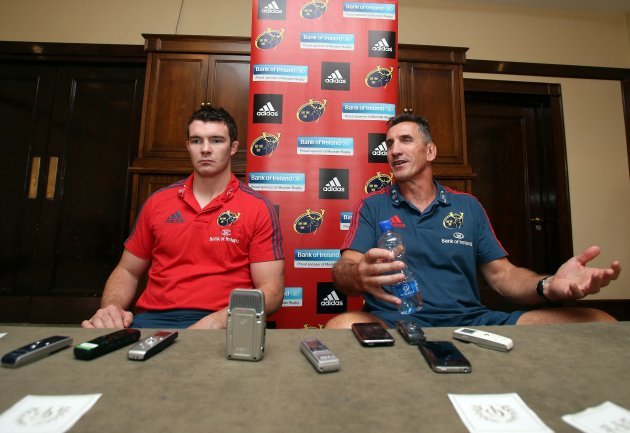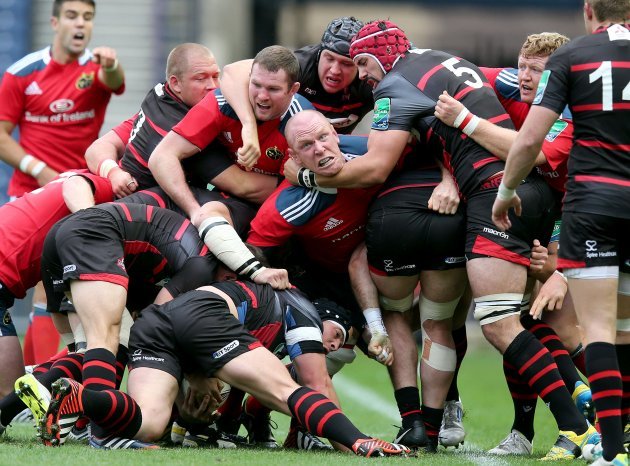‘We’re gonna look through the video obviously and there’s gonna be a lot of people walking and not excited about getting into position and that is really disappointing. You gotta love what you do, and today there was no love there‘– Rob Penney speaking to SkySports after Edinburgh 29 – 23 Munster.
If you watch the old documentaries about Graham Taylor and Bobby Robson, one thing that strikes you straight away is the level of access the media had in those days.
The managers had no press officer, no assistants, no physical or administrative layer between them and the tabloid hacks. Taylor and Robson thought being polite and reasonable would help generate respect between all parties. We now know that didn’t work, and the mid 90s saw a rapid change in the way footballers and the media communicated with each other.
It started with their national team, but quickly spread to their other major sports including cricket, and rugby. Professional outfits in Ireland soon followed suit, putting structure to their media relations, providing media training for their players, restraining the more talkative ones, putting a spin on the message, and generally adding a layer of blandness to everything.
©INPHO/Dan Sheridan
Because we’re so close to England, and because football is the dominant sport, we have now accepted this is the only way to do things. The truth is, every country and every sport has a different attitude to the press. After Six Nations games the French players will spend up to an hour talking to the print journalists, usually in a back and forth conversational style. In the week of a test match the Australian squad are sent into a room full of journalists and told to go and mingle. In Italy they will, on occasion, dine together.
There seems to be a belief in this country that if you talk too much, you will be punished by some kind of sporting karma. When it first became obvious Ronan O’Gara was a straight talker, Munster and Ireland fans braced themselves for the inevitable stumble. It never happened, because there is no relationship between honesty and failure, as proven by Roy Keane, Keith Wood, Derval O’Rourke, Harrington and many others.
Rob Penney comes from Canterbury, where they’ve nothing to hide, because the region knows nothing but success. He has been forthright since the day he arrived in Munster, setting out his gameplan and his ambitions for the team. He has sometimes bristled at criticism, but has never hidden his feelings.
In admitting after the Edinburgh loss that ‘it’s always a worrying sign when you walk into a changing room and there’s not a lot of noise, not a lot of excitement there’ and that ‘mental application was nowhere near what it needed to be’, he has, undoubtedly, broken new ground.
It’s one thing to debate the respective merits of old and new Munster, but another to proclaim the desire wasn’t there. Given the province he now works for, where everything has been built on the premise that hard work and humility will conquer all, this will come as a huge blow to the fans. Telling Munster their work ethic is suspect is like telling a comedian he’s not funny.
Truth
There is a growing consensus this week, then, that Penney should have kept quiet, that this is the very time you keep things in-house. If it’s the truth, though, then he’s right to say it. He’s a smart man and will understand the consequences of his actions. He knows this could have a greater impact on the intended targets when said in public rather than in private, and he already said the coaches tried everything they could at half time to create a spark, but the players didn’t respond.
The team showed against Leinster and at stages last year that they’ve huge potential, so why isn’t that being shown week after week. Paul O’Connell and Donnacha Ryan could sense this poor performance coming from early in the game.
©INPHO/Dan Sheridan
In the first half they could be seen shouting at members of the backline, and consulted each other about how to turn the tide. Penney might be deliberately touching on a longer term issue here, and maybe he wants the fans to know whats happening.
There are lots of interesting things to discuss about Penney’s performance as a coach against Edinburgh – where were the backline moves, what happened the lineout, why did the props receive more passes in the game than a lively looking Keith Earls?
In the long-term though, Penney will be judged on his results. After the misery of Murrayfield they will play with a special Munster style fury in Thomond, and that will probably be enough to get a win. Yet no matter what happens against Gloucester, the result will not be impacted by what their head coach said to a reporter last weekend.


